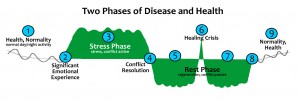A couple of weekends ago, I had the privilege of attending a META-medicine weekend taught by Richard Flook (www.whyamisick.com). META-medicine combines many energetic tools with the research of German New Medicine (https://www.germannewmedicine.ca/). I’m not going to go into a lot of detail, but if you want to learn more about both or either of these methodologies I encourage you to visit their sites and read Richard’s book (Why Am I Sick) for a new way of looking at disease.
From a nutritional perspective, I wanted to discuss the two phases of disease so that you might be able to understand how our body works with respect to the food it craves.
According to both META-medicine and GNM, after the body undergoes a shock, there are two main phases – stress (immediately after the Significant Emotional Experience 2) followed by rest.
During the stress phase, the body is reacting from the Sympathetic Nervous System programming of fight, or flight. The blood thins, the blood pressure increases – the body is in a state of alertness and needs to be naturally acidic. To maintain this state, the cells are working and need energy. We need energy foods, and supplements or drugs that keep the body in this state of alertness. We crave foods like red meat, dairy, high sugar and salt foods, processed foods (quick energy), drinks like alcohol, caffeine, tea, high energy drinks, supplements such as caffeine tablets, drugs such as cortisone, smoking and chemotherapy. These foods both give quick energy and are acidic.
Activities such as sports, watching certain sports, intensive travel, fighting, arguing, worry all increase acidity further.
In the second phase, our body needs to heal and rest. The body is reacting from the Parasympathetic Nervous System patterns of digesting, relaxing and repair. The blood thickens, the blood pressure drops, the body becomes more alkaline.
To heal, the body needs to eat foods that alkalise, such as vegetables, some fruit, beans, grains and nuts, drinks such as camomile teas and fruit teas, supplements like Magnesium and Selenium.
This rest and regeneration phase is assisted by activities such as massage, meditation, energetic healing, yoga, emotional clearing techniques and naps during the day.
Our diets reflect what we are going through in our lives as well. We are naturally attracted to the foods that our bodies require in order to do the job they need to do. In addition, many of us are eating foods through habit, which keep our bodies stuck in the stress phase. The longer our bodies stay in the stress phase the harder it is to remove all of the toxins built up through the energy production and the break down of the cells.
In our current stressful lifestyles, it often takes the combination of an alkalising diet, meditation and mental clearing, and a detoxification program in order for our bodies to be able to regenerate and heal.
There’s a lot of information available online about alkalising diets, but I personally like best the information from Robert and Shelly Young who wrote The pH Miracle. Their blog is an excellent resource: Articles of Health. And you can get a free list of alkaline foods if you sign in at Energise for Life. A vegetarian diet that focuses on lots of raw and steamed vegetables (juicing is great too as long as you’re eating fibre elsewhere in your diet), sea vegetables, protein from the combination of whole grains (brown rice, kamut, quinoa, oats, teff, spelt, bulgur, amaranth), nuts and seeds, and beans, lentils and peas. Small amounts of fish and chicken can be added once the pH of your saliva starts to stabilize around 7.365. The longer you’ve been living a stress-filled lifestyle, the longer you’ll need to alkalise.
One caveat – If you decide to take alkalising supplements, I strongly recommend that you have the support of a naturopathic or homeopathic practioner. Also, your stomach needs to be acidic in order to digest food so you don’t want to be alkalising within one hour of eating.

